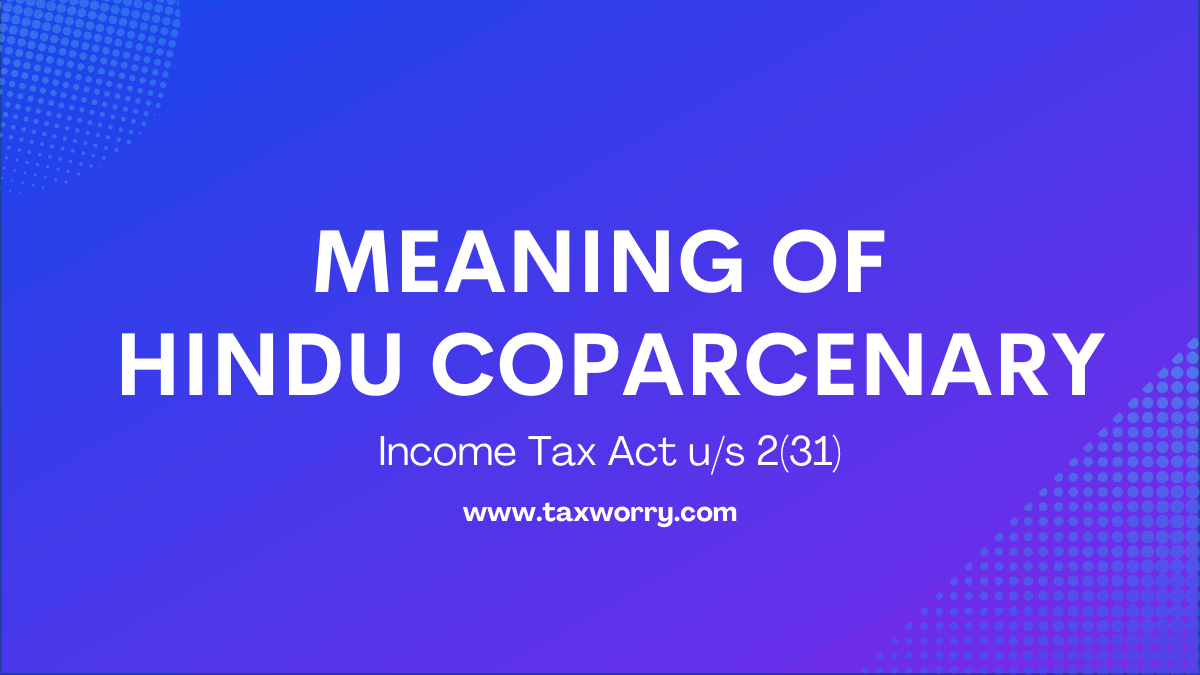Meaning of tax terms
Meaning of “Hindu Coparcenary”
The meaning of Hindu coparcenary under section 2(31) of the Income Tax Act is not defined in the act itself. But we can take guidance from decisions by various high courts. Here are excerpts of courts orders in which the Hon’ble Supreme Court tried to explain the meaning of Hindu coparcenary.

Meaning of Hindu Coparcenary
The phrase ‘hindu coparcenary’ used in section 2(31) of the Income Tax Act came up before various supreme courts as detailed under :
1. Hon’ble Supreme Court explained the meaning of “Hindu coparcenary” while delivering judgment in N.V. Narendranath Vs. CIT [1969] 74 ITR 190 (SC) as under :
Meaning: A ‘hindu coparcenary’ is a much narrower body than the hindu joint family; it includes only those persons who acquire by birth an interest in the joint or coparcenary property, these being the sons, grandsons and great grandsons of the holder of the joint property for the time being.
2. Hon’ble Supreme Court explained the meaning of “Hindu coparcenary” while delivering judgment in Ced Vs. Alladi Kuppuswamy [1977] 108 ITR 439 (SC) as under :
Meaning : A hindu coparcenary has six essential characteristics, namely : (1) that the lineal male descendants up to the third generation acquire an independent right of ownership by birth and not as representing their ancestors; (2) that the members of the coparcenary have the right to work out their rights by demanding partition;
(3) that until partition, each member has got ownership extending over the entire property conjointly with the rest and so long as no partition takes place, it is difficult for any coparcener to predicate the share which he might receive; (4) that as a result of such co-ownership the possession and enjoyment of the property is common;
(5) that there can be no alienation of the property without the concurrence of the other coparceners unless it is to be for legal necessity; and (6) that the interest of a deceased member lapses on his death and merges in the coparcenary property.
Note : the last characteristic is subject to the provisions of the hindu succession act, 1956 which assumes a notional partition if a hindu coparcenar governed by the mitakshara school of law dies intestate and is survived by a female relative in class i.
Section 2(31) of Income Tax Act
2(31). “person” includes—
(i) an individual,
(ii) a Hindu undivided family,
(iii) a company,
(iv) a firm,
(v) an association of persons or a body of individuals, whether incorporated or not,
(vi) a local authority, and
(vii) every artificial juridical person, not falling within any of the preceding sub-clauses.
Explanation.—For the purposes of this clause, an association of persons or a body of individuals or a local authority or an artificial juridical person shall be deemed to be a person, whether or not such person or body or authority or juridical person was formed or established or incorporated with the object of deriving income, profits or gains;
Updated up to Finance Act 2021
